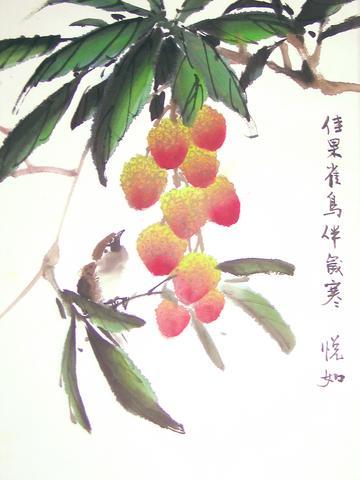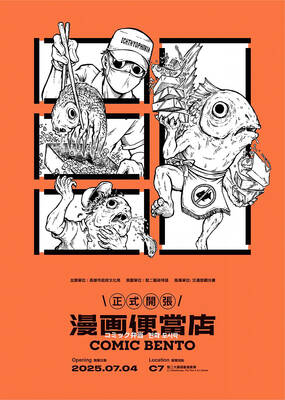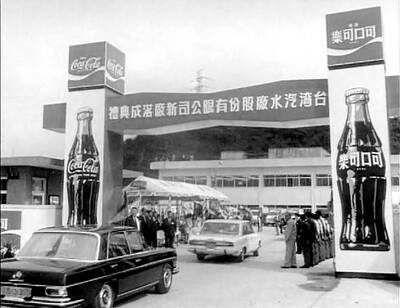A Chinese brush painting (
It sounds complicated, yet for many Chinese, painting can be considered a form of meditation or a relaxing hobby. For others, it's a means to learn about Chinese arts and culture.

PHOTO: DIANA FREUNDL, TAIPEI TIMES
There are numerous schools offering art classes in Taipei and understandably most are in Chinese. Brush artist and instructor Lin Hong-jia (
Lin's daughter Jessica Lin (
Clearly, understanding Chinese is not a prerequisite for taking an art class.
"Because so much of the class is visual, a lot can be learned by just following along. As you study the technique, you can also study the
language," the elder Lin said. In addition to his Tianmu location, he has been offering Chinese and Western oil painting classes for more than 30 years at his gallery in Zhongxiao East Road area.
Lin said that many of the students have little, if any, background in painting. "We teach people of all ages, mothers, their children, even businessmen. It doesn't matter how old someone is when they start."
"Some of best students are those with no previous training. The most important thing is to relax and enjoy the class," he said.
Those too shy to partake in group classes can arrange for private lessons through various art schools or with instructor and graduate students in university departments.
An average class-size is between two to 10 students and is priced at NT$5,800 for 24 hours (12 two-hour classes).
Lin's prices are comparable to others around town. Classes are ongoing and those interested can either call to register or stop by the gallery. Many studios offer instruction in Chinese only.
Class Information:
Classes in English and Chinese
Tianmu: Yi-Jhan Gallery
Community Services Center :
25, Ln 29, Zhongshan N Rd, Sec 6, Taipei
Classes in Chinese only
Zhongxiao: Yi-Jhan Gallery Fl 2, 7 Zhongxiao E Rd, Sec 6, Taipei
Tel: (02) 2786 5858.
Yonghe: Hippopotamus Art Studio (next to Fuhsing Mei Gung Art College) 191, Xiangliang Rd, Sec.1, Yonghe
Tel: (02) 2233 1718.
Private or small group classes with Chinese brush artist
Peng Kang-long
Tel: (0911) 831 212.

From the last quarter of 2001, research shows that real housing prices nearly tripled (before a 2012 law to enforce housing price registration, researchers tracked a few large real estate firms to estimate housing price behavior). Incomes have not kept pace, though this has not yet led to defaults. Instead, an increasing chunk of household income goes to mortgage payments. This suggests that even if incomes grow, the mortgage squeeze will still make voters feel like their paychecks won’t stretch to cover expenses. The housing price rises in the last two decades are now driving higher rents. The rental market

Fifty-five years ago, a .25-caliber Beretta fired in the revolving door of New York’s Plaza Hotel set Taiwan on an unexpected path to democracy. As Chinese military incursions intensify today, a new documentary, When the Spring Rain Falls (春雨424), revisits that 1970 assassination attempt on then-vice premier Chiang Ching-kuo (蔣經國). Director Sylvia Feng (馮賢賢) raises the question Taiwan faces under existential threat: “How do we safeguard our fragile democracy and precious freedom?” ASSASSINATION After its retreat to Taiwan in 1949, the Chinese Nationalist Party (KMT) regime under Chiang Kai-shek (蔣介石) imposed a ruthless military rule, crushing democratic aspirations and kidnapping dissidents from

It looks like a restaurant — but it’s food for the mind. Kaohsiung’s Pier-2 Art Center is currently hosting Comic Bento (漫畫便當店), an immersive and quirky exhibition that spotlights Taiwanese comic and animation artists. The entire show is designed like a playful bento shop, where books, plushies and installations are laid out like food offerings — with a much deeper cultural bite. Visitors first enter what looks like a self-service restaurant. Comics, toys and merchandise are displayed buffet-style in trays typically used for lunch servings. Posters on the walls present each comic as a nutritional label for the stories and an ingredient

July 28 to Aug. 3 Former president Chiang Kai-shek (蔣介石) reportedly maintained a simple diet and preferred to drink warm water — but one indulgence he enjoyed was a banned drink: Coca-Cola. Although a Coca-Cola plant was built in Taiwan in 1957, It was only allowed to sell to the US military and other American agencies. However, Chiang’s aides recall procuring the soft drink at US military exchange stores, and there’s also records of the Presidential Office ordering in bulk from Hong Kong. By the 1960s, it wasn’t difficult for those with means or connections to obtain Coca-Cola from the